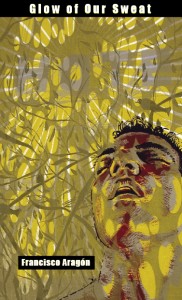Small Press Spotlight: Scapegoat Press

i'm always excited when i learn about a new independent press. last month i read a review copy of one of their forthcoming publications: francisco aragón's Glow of Our Sweat. one reason why i love francisco's book is that it combines poetry, translations, and a prose essay. i've never read a collection by a poet/translator that includes both the poet's original poetry and his translations of other poets. pretty groundbreaking. & adds another element to our discussion about translation. anyways, i sent scapegoat editor, ben furnish, some questions about the press, and his responses are below.
are there any small presses out there that have recently caught your eye? i'd love to hear about them.
q&a with ben furnish:
When and why did you start Scapegoat Press?
Though I had dreamed of starting a press since I learned to read and started planning Scapegoat many years ago, its first project was reissuing Linda Rodriguez’s chapbook Skin Hunger in 2007. Scapegoat aims to shine a light on remarkable writing from America’s diverse communities.
Why did you choose the name “scapegoat”?
Penguin, Bantam, Borzoi, Red Hen, Ugly Duckling. There’s a venerable history of using memorable but somewhat inscrutable animal names in publishing. And goats are sweet, mischievous, undervalued creatures, and it’s about time they got some publishing acknowledgment.
What challenges and rewards have you faced as a publisher?
The biggest reward is the freedom to make our own choices to promote work we love. Small presses have always exerted influence beyond their sheer size and balance sheet, and that’s still true today. We can do projects that won’t fit neatly with a larger commercial press or a university-based press. We don’t have a lot of money to lose. But we don’t have a lot of money to gain either: A big challenge is distribution, which is harder than ever these days when all print-based media are in major flux.
How do you approach the question of ethnic and racial equity in publishing?
Right now, we are focusing on Latino writers. I really welcomed your discussion of the equity issue recently on Harriet. In fact, I think the whole issue of multicultural representation in poetry publishing is emblematic of where our country is with diversity as a whole. For whatever reason, poetry books don’t reflect the diversity of the country. Just as in many other more material ways, our country still faces major imbalances. One can speculate endlessly about the causes and the reasons, but maybe it’s more important for each of us to just do what we can to change it.
Describe some of your past and recent books and future projects?
The Latino Writers Collective, based in Kansas City, is doing amazing work. They wanted to do an anthology, and I thought, let’s just do it! The result was Primera Página: Poetry from the Latino Heartland, which won second place in the International Latino Book Awards in poetry, among other honors. Yet this is not your typical anthology. It includes work by well published poets like Gloria Vando, Andrés Rodríguez, and Linda Rodriguez, but it also includes poetry by folks relatively new to the poetry scene. None of the contributors can be called academic hot-house flowers. Contributors include a policeman, visual artists, students and grandmothers, activists and youth workers. Much of the poetry is fun, but all of it is artistically serious, and audiences and readers connect with it.
Scapegoat followed it up with a fiction anthology from the Latino Writers Collective, Cuentos del Centro: Fiction from the Latino Heartland, a Latinostories.com top-ten new-authors pick for 2010. These two books should explode any stereotypes about Latino literary life in the Midwest.
Glow of Our Sweat by Francisco Aragón, forthcoming in April, is primarily a poetry collection, including some notable translations, but its prose afterword forms a conversation with the book’s poems as Aragón explores his own literary identity in relation to gay and Latino culture. He examines “covering,” the tendency to keep silent about gay identity in certain situations. Erving Goffman and Kenji Yoshino have written about the civil rights dimension of covering on stigmatized groups, as Aragón points out. But Aragón goes on to explore the chilling emotional dimension of covering, as well as wider subjects of love and memory and the mystical threads of literary inheritance as reflected in his translations and evocations of Lorca, Darío, Alarcón, and Spicer. Beyond the important contribution this poet makes to the national conversation on diversity, he offers poems of lingering and poignant resonance about the heart’s journey in life.
For our next project, the press hopes to do an anthology of three Puertorriqueña poets who happen to be grandmother, mother, and daughter.
How can one subscribe to your mailing list?
Send an email to scapegoatpress (at) sbcglobal.net. Our new website is going up at www.scapegoat-press.com.
Craig Santos Perez is a native Chamoru (Chamorro) from the Pacific Island of Guåhan/Guam. He is the ...
Read Full Biography

